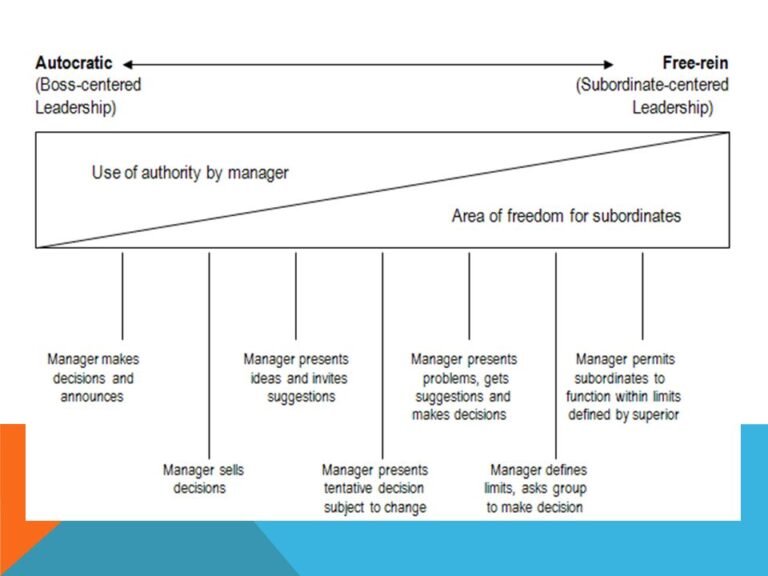Responsibility Delegation and Authority
Responsibility, delegation, and authority are fundamental management skills.
Responsibility is the liability of a person to be called to account for their actions and results and is, therefore, an obligation to do something.
Delegation is giving a subordinate the discretion to make decisions within a precisely defined sphere of influence. Therefore, the superior must possess the authority to delegate.
The critical element here is discretion and the level of authority within a specific sphere. Without delegation, formal organizations could not exist. An organization chart may show an organization’s command structure, but without power, responsibility, and delegation, a formal organization cannot be effective. They are critical aspects.
Delegation Authority and Responsibility
What is Responsibility
Responsibility is an obligation placed on a person who occupies a specific position. It is accountability for the performance of specified duties or the satisfactory achievement of defined company objectives. Because responsibility is an obligation owed, it cannot be delegated. No superior can escape responsibility for subordinates’ activities, for it is the supervisor who delegates authority and assigns the duties. It does follow, however, that the assistant has a responsibility back to his superior.
Once a subordinate has accepted the assignment and the power to carry it out, his or her responsibility is absolute.
Unlike authority, responsibility cannot be delegated. There are, however, differing views on the extent to which this statement is true. There is a view that the idea of responsibility cannot be delegated too simplistic. Any task contains an element of accountability. This underlines the doctrine of absolute responsibility; the superior is always ultimately accountable.
What is Authority
Henri Fayol defined authority as ―the right to give orders and the power to exact obedience. It is the right to exercise control, such as hiring and firing or buying and selling on behalf of the organization. Authority refers to the relationship between the participants in an organization. The authority structure provides the basis for assigning tasks to the various elements-for commanding.
Authority is the scope and amount of discretion given to a person to make decisions under the organization’s position. The authority and power structure of an organization defines:
– The part each member of the organization is expected to perform
💥🎁 New Year & Easter Deals On Amazon !
Don't miss out on the best discounts and top-rated products available right now!
🛒 Shop Now and Save Big Today!*As an Amazon Associate, I earn from qualifying purchases.
– The relationship between the organization’s members so that its efforts are effective
The authority source may be top-down (as informal organizations) or bottom-up (as in social organizations and politics).
The concept of authority is closely related to the idea of the legitimate exercise of the power of a position. It depends on the willingness of subordinates to comply with specific directives of superiors. The scope of responsibility must correspond to the extent of authority given.
If a manager is given responsibility without the necessary authority, he is in the invidious position of being powerless to achieve the levels upon which his performance is being judged. Conversely, a person is given power without clear responsibility for achieving specified targets, or without having to report to a more senior manager, is in a position of false security.
What is Delegation?
Delegation is when a manager or supervisor transfers part of his or her legitimate authority to a subordinate. Along with authority goes responsibility, but while power can be delegated, responsibility remains with the superior, e.g., while a Board of Directors may delegate authority to the managers, the directors are still responsible directly to the shareholders.
Delegation means giving someone else the freedom and authority to do a job for which you are accountable. This action implies that the person receiving the delegated work will handle it on his or her initiative and that you have confidence in the ability of the delegatee to do the job successfully.
Delegation is an essential aspect of the organization and effective management.
Delegation is giving a subordinate the discretion to make decisions within a specific, defined sphere of influence. Therefore, the superior must possess the authority to delegate.
The critical element here is discretion and the level of authority within a specific sphere. Without delegation, formal organizations could not exist. An organization chart may show an organization’s command structure, but without authority, responsibility, and delegation, a formal organization cannot be effective. They are critical aspects.
Without delegation, formal organizations could not exist. If there were no delegation, the chief executive would be responsible for everything and would be the only person with the authority to do anything. Consequently, nothing much would ever get done. Because management is the act of getting things done (accomplishing objectives) through other people’s work, to put it simply, it is evident that management could not succeed without delegation.
💥🎁 New Year & Easter Deals On Amazon !
Don't miss out on the best discounts and top-rated products available right now!
🛒 Shop Now and Save Big Today!*As an Amazon Associate, I earn from qualifying purchases.
Delegations in Small organizations
In all but the smallest of organizations, some degree of delegation is necessary, as there are physical and mental limitations to the work that can be undertaken by any manager. This, in turn, allows subordinates to gain experience and demonstrate how they can perform.
Importance of Delegations
From these points the allowing practical advantages can be derived:
– The workload of the manager is reduced, allowing more time to concentrate on strategic duties.
– Subordinates can gain useful experience for future management.
– Delegation can lead to decentralization, allowing divisional or branch managers to react quicker to local changes than managers at head office.
– Allowing subordinates to perform the work of a higher grade can aid their development.
– Management can see how subordinates tackle a higher grade and how they cope with different authorities.
– Effective deployment of resources fulfills value for money criteria.
Delegation of Duties and Responsibilities
Effective delegation can be achieved by:
– Specifying expected performance levels and ensure that they are understood
💥🎁 New Year & Easter Deals On Amazon !
Don't miss out on the best discounts and top-rated products available right now!
🛒 Shop Now and Save Big Today!*As an Amazon Associate, I earn from qualifying purchases.
– Assigning agreed tasks to the subordinate
– Allocating of appropriate and adequate resources
– Ensuring that responsibility is exacted from the subordinate (i.e., responsibility is upwards)
– Ensuring that the associate has the ability and experience to undertake the tasks maintaining frequent contact
– Giving the subordinate written authority to do the job, which might be specific or general. This provides greater discretion.
Guidelines for Effective Delegation
When a manager or supervisor delegates, there is a calculated risk being taken on the subordinate’s abilities. The best ways to ensure effective delegation are to:
– Define the limits of authority delegated to the assistant by giving an outline of the job, the control limits, and the desired standards and ensuring that the assistant accepts and understands what is involved.
– Allocate sufficient resources.
– Be satisfied that the subordinate is competent to exercise that authority.
– Be disciplined enough to permit the subordinate the full use of that authority without constant checks and interference and to be willing to listen to the subordinate’s ideas.
💥🎁 New Year & Easter Deals On Amazon !
Don't miss out on the best discounts and top-rated products available right now!
🛒 Shop Now and Save Big Today!*As an Amazon Associate, I earn from qualifying purchases.
– Link achievement with reward.
Common Delegation Problems
There are common problems associated with delegation, namely:
– Failure to delegate sufficient authority
– Need for higher managerial skill
– Loss of direct control
– Lack of confidence in both the subordinate and the person delegating
– Danger of a less satisfactory outcome/lower productivity
– Fear of losing one’s job to a good subordinate
– Boss is secure and comfortable in his old job
– Subordinate may become impatient for monetary recognition
💥🎁 New Year & Easter Deals On Amazon !
Don't miss out on the best discounts and top-rated products available right now!
🛒 Shop Now and Save Big Today!*As an Amazon Associate, I earn from qualifying purchases.
– Doubt over what to delegate and what to keep
– Failure to monitor and counsel
How to overcome delegation problems
The problems can be minimized by considering the following points:
– The manager should not delegate so much as to overload a subordinate totally
– The employee has reasonable skill and experience in the area concerned
– The employee is carefully selected and trained
– Appropriate authority is delegated
– The manager remembers to monitor and control
– The manager is not merely ―passing the buck or ―opt out.
– All concerned know that the task has been delegated. There is an open communication system
💥🎁 New Year & Easter Deals On Amazon !
Don't miss out on the best discounts and top-rated products available right now!
🛒 Shop Now and Save Big Today!*As an Amazon Associate, I earn from qualifying purchases.
– The manager puts time aside for coaching and guiding
– If the delegation goes well, the person will expect a reward, e.g., upgrade job/more pay.


